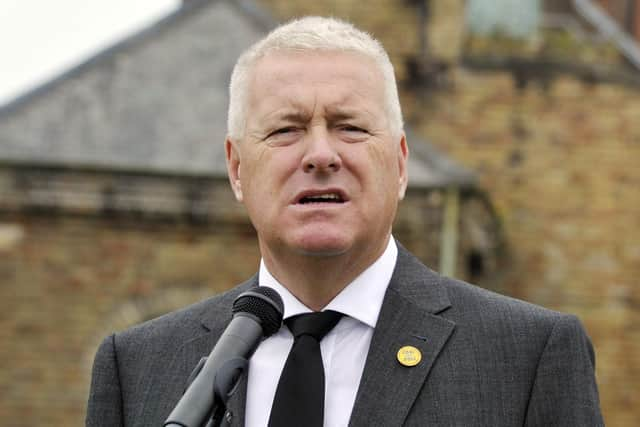Ian Lavery MP says Northumberland miners 'proven right' 40 years on from 1984 miners' strike
and live on Freeview channel 276
Ian Lavery was a 21-year-old apprentice at Ellington Colliery in Northumberland when, in 1984, tens of thousands miners across the country began a year-long strike aimed at preventing the closure of pits that defined the way of life for towns and villages across the UK’s industrial heartlands.
Mr Lavery, now the Labour MP for Wansbeck, recalls how the bitter industrial dispute that pitted the miners against Margaret Thatcher’s Tory government became “a war” as clashes with police brought violence to the streets and families endured 12 months of hardship and conflict.
Advertisement
Hide AdAdvertisement
Hide AdFour decades later, and having witnessed the total loss of mines across the Northumberland coalfield, he believes the legacy of the strike and the ultimate closure of pits remains clear to see.


The Ashington native, who would go on to succeed Arthur Scargill as president of the National Union of Mineworkers (NUM) in 2002, said: “The strike was not about wages, it was about making sure that these towns and villages could survive into the future, that the pits would remain open, and people would have decent jobs.
"It was a tough job, but people were proud of working underground and we believed in what we were fighting for.
“40 years on, it was clearly worth fighting for and we have been proven right. The decimation of the Northumberland and Durham coalfield since then is there to be seen.
Advertisement
Hide AdAdvertisement
Hide Ad“The community spirit still lingers on, but it is very difficult now. There is more poverty than these places have ever experienced before, crime rates are higher than the norm. Our mining communities have been battered.
“There was not a plan for the future. I think anyone would realise now that there was a need for a transition to a green economy, but there was no plan to invest in clean coal technology, no plan for those towns and villages to have future employment.
"It was a destruction job and the government knew the consequences of what it was doing.”
While apprentices had been given the NUM’s blessing to continue working, Mr Lavery opted to strike on the advice of his dad, Jack, also a miner.
Advertisement
Hide AdAdvertisement
Hide AdHe remembers how the situation turned into “a war on a daily basis” and feeling that his hometown had become a “police state” as officers from different parts of the country were drafted in to deal with picketing miners, adding that the ensuing clashes left many people unable to forgive or trust the police to this day.
He added: “I have a good relationship with the police in my area now. But there are people who will go to their graves without ever feeling any support for the police because of the actions of the officers back then. For some people, every police officer is tarred with the same brush.”
And, as the nation looks back on post-war Britain’s biggest industrial dispute, Mr Lavery has called for children to be taught about the history of the miners’ strike in school to ensure that its deep impact on society is not forgotten by future generations.
The MP said: “The documentaries we have seen on the TV lately do not tell the whole story, only part of it. I think the history of industrial disputes, and especially the miners, should be on the national curriculum.
Advertisement
Hide AdAdvertisement
Hide Ad"It should explain to people what happened and what the consequences have been because we have to try and learn from our history.
“Our old miners’ banners used to say ‘the past we inherit, the future we build’. You cannot build unless you are aware of the history that has come before.
“It is really important to ensure that people do not forget what happened. But it has to be the full picture, it cannot be slanted by people’s political views.”
A wave of pit closures followed the end of the strike in 1985 and Ellington ultimately became the last deep coal mine in the North East before it was closed down in 2005.
Advertisement
Hide AdAdvertisement
Hide AdReflecting on the legacy of mining across the region today, Mr Lavery said: “It is massively different now. I grew up in Ashington. It was Coal Town and at one time the biggest mining town in Europe.
"The entire reason the town was there, and it was the same up and down the coast through Northumberland and Durham, was coal.
“Coal generated the local economy and the miners themselves used their own finances to build libraries, swimming pools, leisure centres, to support activities.
"The traditions were great. Whippet racing, pigeon racing, leek growing. It was a different time but there is a lot we could still look at for the future.
Advertisement
Hide AdAdvertisement
Hide Ad“The community splits and the way that people pulled together, despite whatever differences they had. It was not a utopia, far from it. But the community was amazing and the strike would never have lasted as long without the Women Against Pit Closures.”
He added: “Look at the area then. Decent jobs, security, decent money. Jobs in mining, electrical jobs, mechanical engineering, we had surveyors, bricklayers, plumbers, all the different trades and all with excellent qualifications. Everyone had a few quid to make sure that their family was okay.
“Life was different back then, but it felt like we had more control. But what we see up and down the North East now is devastation as a result of the destruction of the mining industry.
“We have lots of people unemployed without a hope for the future. We have not had the investment in industry that we needed. We have a lot of businesses here, but it is not enough to create what we had before with mass job opportunities, good wages and conditions, and security in our communities.”